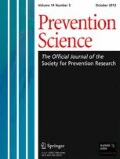References
Boudreaux, E. D., Sullivan, A., Abar, B., Bernstein, S., Ginde, A. A., & Camargo, C. A. (2012). Motivation rulers for smoking cessation: A prospective observational examination of construct and predictive validity. Addiction Science & Clinical Practice, 7, 8.
Bradshaw, C. P., Pas, E. T., Bottiani, J. H., Debnam, K. J., Reinke, W. M., Herman, K. C., & Rosenberg, M. S. (2018). Promoting cultural responsivity and student engagement through double check coaching of classroom teachers: An efficacy study. School Psychology Review, 47, 118–134.
Conroy, M. A., Sutherland, K. S., Algina, J. J., Wilson, R. E., Martinez, J. R., & Whalon, K. (2015). Measuring teacher implementation of the BEST in CLASS intervention program and corollary child outcomes. Journal of Emotional and Behavioral Disorders, 23, 144–155.
Dishion, T. J., Nelson, S. E., & Kavanagh, K. (2003). The family check-up with high-risk young adolescents: Preventing early-onset substance use by parent monitoring. Behavior Therapy, 34, 553–571.
Epstein, M., Atkins, M., Culinan, D., Kutash, K., Weaver, R. (2008). Reducing behavior problems in the elementary school classroom. IES Practice Guide. U.S. Department of Education, National Center for Education Statistics. Washington, DC: U.S. Government Printing Office. https://ies.ed.gov/ncee/wwc/PracticeGuide/4. Accessed 7 July 2019.
Fabiano, G. A., Vujnovic, R., Pelham, W. E., Waschbusch, D. A., Massetti, G. M., Yu, J., … Volker, M. (2010). Enhancing the effectiveness of special education programming for children with ADHD using a daily report card. School Psychology Review, 39, 219–239.
Frank, J. L., & Kratochwill, T. R. (2014). School-based problem-solving consultation. In W. P. Erchul & S. M. Sheridan (Eds.), Handbook of Research in School Consultation (2nd ed., pp. 18–39). New York: Routledge.
Greenberg, M.T., Brown J.L., Abenavoli, R.M. (2016). Teacher stress and health effects on teachers, students, and schools. Resource Document. Edna Bennett Pierce Prevention Research Center, Pennsylvania State University. Accessed July 1, 2019. https://www.rwjf.org/en/library/research/2016/07/teacher-stress-and-health.html.
Han, S. S., & Weiss, B. (2005). Sustainability of teacher implementation of school-based mental health programs. Journal of Abnormal Child Psychology, 33, 665–679.
Hart, K. C., Fabiano, G. A., Evans, S. W., Manos, M. J., Hannah, J. N., & Vujnovic, R. K. (2017). Elementary and middle school teachers’ self-reported use of positive behavioral supports for children with ADHD: A national survey. Journal of Emotional and Behavioral Disorders, 25, 246–256.
Magill, M., Gaume, J., Apodaca, T. R., Walthers, J., Mastroleo, N. R., Borsari, B., & Longabaugh, R. (2014). The technical hypothesis of motivational interviewing: A meta-analysis of MI’s key causal model. Journal of Consulting and Clinical Psychology, 82, 973–983.
Miller, W. R., & Rollnick, S. (2013). Motivational interviewing: Helping people change. New York: Guilford press.
Mortenson, B. P., & Witt, J. C. (1998). The use of weekly performance feedback to increase teacher implementation of a prereferral academic intervention. School Psychology Review, 27, 613–627.
Noell, G., Witt, J., Gilbertson, D., Ranier, D., & Freeland, J. (1997). Increasing teacher intervention implementation in general education settings through consultation and performance feedback. School Psychology Quarterly, 12, 77–88.
Owens, J. S., Coles, E. K., Evans, S. W., Himawan, L. K., Girio-Herrera, E., Holdaway, A. S., et al. (2017). Using multi-component consultation to increase the integrity with which teachers implement behavioral classroom interventions: A pilot study. School Mental Health, 9, 218–234.
Owens, J. S., Holdaway, A. S., Smith, J., Evans, S. W., Himawan, L. K., Coles, E. K., Girio-Herrera, E., Mixon, C., Egan, T. E., & Dawson, A. E. (2018). Rates of common classroom behavior management strategies and their associations with challenging student behavior in elementary school. Journal of Emotional and Behavioral Disorders, 26, 156–169.
Owens, J.S., Evans, S.W., Coles, E.K., Himawan, L.K., Holdaway, A.S., Mixon, C., & Egan, T. (2019). Consultation for classroom management and targeted interventions: Examining benchmarks for teacher practices that produce desired change in student behavior. Journal of Emotional and Behavioral Disorders. https://doi.org/10.1177/1063426618795440.
Pyle, K., & Fabiano, G. A. (2017). Daily report card intervention and attention deficit hyperactivity disorder: A meta-analysis of single-case studies. Exceptional Children, 83, 378–395.
Reinke, W. M., Lewis-Palmer, T., & Merrell, K. (2008). The classroom check-up: A classwide teacher consultation model for increasing praise and decreasing disruptive behavior. School Psychology Review, 37, 315–332.
Robb, J. A., Sibley, M. H., Pelham, W. E., Foster, E. M., Molina, B. S., Gnagy, E. M., & Kuriyan, A. B. (2011). The estimated annual cost of ADHD to the US education system. School Mental Health, 3, 169–177.
Romano, M., & Peters, L. (2016). Understanding the process of motivational interviewing: A review of the relational and technical hypotheses. Psychotherapy Research, 26, 220–240.
Funding
The research was supported by the Institute of Education Sciences, U.S. Department of Education (R324A120272).
Author information
Authors and Affiliations
Corresponding author
Ethics declarations
Conflict of Interest
The authors declare that they have no conflict of interest.
Ethical Approval
Procedures were approved by the Institutional Review Boards at both universities and within all school districts. All procedures were performed in accordance with the ethical standards as laid down in the 1964 Declaration of Helsinki and its later amendments or comparable ethical standards.
Informed Consent
Informed consent was obtained from all participants in the study.
Disclaimer
The opinions expressed are those of the authors and do not represent views of the Institute or the U.S. Department of Education.
Additional information
Publisher’s Note
Springer Nature remains neutral with regard to jurisdictional claims in published maps and institutional affiliations.
Rights and permissions
About this article
Cite this article
Owens, J.S., Lee, M., Kassab, H. et al. Motivational Ruler Ratings among Teachers Receiving Coaching in Classroom Management: Measurement and Relationship to Implementation Integrity. Prev Sci 22, 769–774 (2021). https://doi.org/10.1007/s11121-020-01111-9
Published:
Issue Date:
DOI: https://doi.org/10.1007/s11121-020-01111-9

